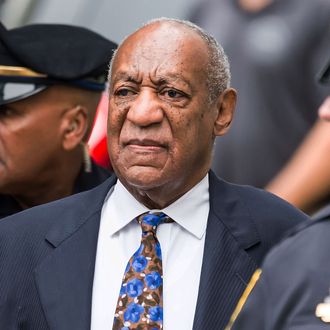
After serving nearly two of his three-to-ten-year sentence for drugging and sexually assaulting former Temple University employee Andrea Constand in his suburban Philadelphia home in 2004, Bill Cosby has won an appeal. Today, the Pennsylvania Supreme Court agreed to review the former comedian’s felony case from 2018, which ended in his conviction on three different counts of aggravated felony sexual assault.
As the first case of its kind to consider the impact of the Me Too movement, today’s decision will test whether Cosby’s conviction could be overturned on technicalities, like the judge’s decision to allow prosecutors to call accusers other than Constand to testify. During the second trial (the first ended in a hung jury in 2017), several women told powerful stories under oath about incidents in which they say Cosby drugged and sexually assaulted them during the past several decades.
Cosby’s legal team has long argued that these testimonies were prejudicial, along with the entertainer’s deposition from a defamation lawsuit in 2006 in which he admitted to extramarital affairs and giving women Quaaludes. They also argued that because Cosby had an agreement with the former Montgomery County prosecutor that he would not be tried if he gave the deposition, his statements should never have been used as evidence in the criminal case.
Montgomery County judge Steven O’Neill disagreed, saying that Cosby’s predation toward courting young women and gaining their trust before incapacitating and sexually assaulting them shows a distinct pattern. “These chilling similarities rendered [their] testimony admissible,” he wrote in a post-trial opinion.
To date, dozens of women have gone public with accusations that Cosby drugged and/or sexually assaulted them over the past six decades, including model Janice Dickinson, who testified in the trial that Cosby drugged and raped her in 1982. For them, Cosby’s conviction signaled a big turning point, not only by giving a legitimate voice to accusers but also rethinking how society views sexual crimes against women by powerful men.
The woman at the center of Cosby’s conviction, Constand, today asked the appeals court to not allow “Cosby’s wealth, fame and fortune to win an escape from his maleficent, malignant and downright criminal past.”
Cosby’s spokesperson, Andrew Wyatt, said his client is “extremely thankful” for the decision, calling the jury decision a “false conviction,” one that symbolizes the “destruction of all Black people and people of color in America.”
Cosby, now 82, maintains his innocence, saying that his encounter with Constand was consensual.
A date has not been set for the new hearing.
More From This Series
- Yet Another Accuser Is Suing Bill Cosby
- Bill Cosby Is Being Sued for Sexual Battery
- 9 More Women Sue Bill Cosby for Sexual Assault

